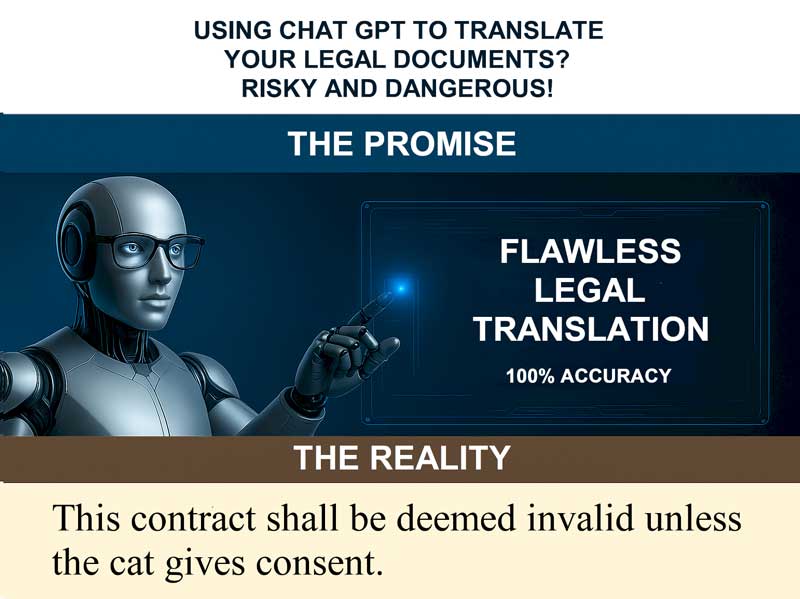

ChatGPT Translated a Legal Doc—and Got It Totally Wrong!
You’ll never guess how badly it messed up…
Let me ask you something: Would you trust an AI like ChatGPT to translate an important legal document for you—something like a will or a contract?
You might be thinking, “Yeah, why not? It’s smart, right? Way better than Google Translate!”
Well… not so fast. You’re going to want to read this before handing over your documents to a 'bot.
Everyone's Using ChatGPT for Translation—But Should You?
It’s no secret that ChatGPT is the hot new toy. People are using it for everything—writing emails, planning vacations, and yes, translating stuff. Some folks even say it’s making Google Translate and DeepL obsolete.
But here’s the kicker: ChatGPT wasn’t even built to translate. And when it tries to? Let’s just say... it’s not exactly bilingual.
In fact, when I asked ChatGPT how good it thinks it is at translation, it straight up admitted:
“GPT-based machine translation is not yet as accurate or reliable as more traditional machine translation systems, especially for complex texts.”
Wait—what? Even ChatGPT is warning you not to trust its translations too much?
Yup.
59 Errors in Just 3 Pages?! Seriously?
Here’s where things get wild.
I tested ChatGPT on a legal translation. Just a few pages. Not rocket science. The result?
59 errors! That’s not just a little “oops”—that’s a full-blown translation trainwreck.
Some errors were straight out of a rookie translator’s playbook—mixing up meanings, awkward phrases… and in a few spots, the translation said the exact opposite of what the original meant.
Now imagine that on a legal document. A contract. A will. A court submission.
Scary stuff.
The AI Just… Deleted Entire Paragraphs?!
No joke—GPT actually left out whole sections of text. Entire sentences, gone.
Why? Because it thought they were redundant.
Now look, in casual writing or marketing content, skipping repetitive stuff can be a good thing. But in legal documents? Every word matters. Repetition is often there on purpose.
Deleting it isn’t just lazy—it’s dangerous.
Don’t Roll the Dice on Legal Translations
The truth is, ChatGPT is a helpful tool—but that’s all it is. A tool. It’s not a lawyer. It’s not a certified translator. And it definitely shouldn’t be handling anything as serious as a legal document all by itself.
Yes, it can give you a rough idea of what a text says. Great for casual use or quick reference.
But if your document actually matters? If there are legal consequences?
Get a real human. A certified, professional translator. Trust me on this one.
Final Word: ChatGPT Isn’t Magic
At the end of the day, GPT isn’t some miracle machine that’s replacing experts. Not yet, anyway.
It’s still learning. It still makes mistakes. It sometimes even makes things up.
So, should you use it for translation? Sure—if it’s just for fun or something informal.
But when it comes to real-life documents that affect your money, your rights, or your future?
Play it safe. Use a pro. Because “good enough” isn’t good enough when the stakes are high.
Have you ever had a weird or hilarious AI translation fail? Shoot us an email—we’d love to see it!
Myles McKelvey, Certified Translator, MA Trans.
McKelvey Communications - www.CertifiedTranslators.ca
Translation - Editing - Copywriting
Phone: 514 483-6833 | Toll-free: 1 855 783-6833
A clear message is a wise investment!
You would like a free estimate of the cost to have a document translated, edited or drafted? Send us your document with:
We will evaluate your document and send you an estimate right away.
 Each certified translation is meticulously prepared by an OTTIAQ-certified translator and is accepted throughout the world for most legal and governmental purposes. However, it is important to find out what is required by authorities prior to having your official documents translated.
Each certified translation is meticulously prepared by an OTTIAQ-certified translator and is accepted throughout the world for most legal and governmental purposes. However, it is important to find out what is required by authorities prior to having your official documents translated.
Each official translation is prepared by an accredited translator
and is recognized throughout the world for most governmental purposes.
 All rights reserved © McKelvey Communications inc. (2006-2025) - A Natmark-Concept inc. project
All rights reserved © McKelvey Communications inc. (2006-2025) - A Natmark-Concept inc. project